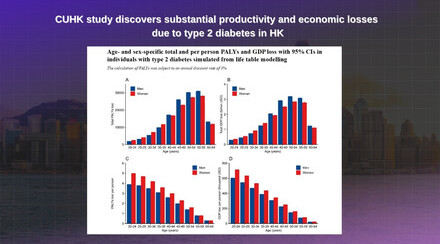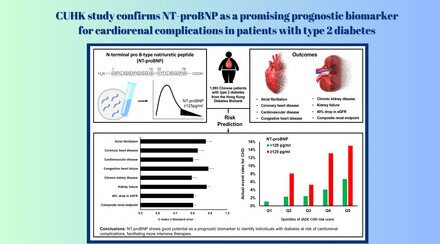CU Medicine Studies Reveal Diabetes Death and Complication Rates Declining - but Not in the Young
Deaths and major complications from diabetes have declined in older people over the last sixteen years but not at all in younger age groups, according to researchers from the Faculty of Medicine at The Chinese University of Hong Kong (CU Medicine). They analysed the data of 770,000 people with diabetes and found that over a 16-year period, the incidence of major complications such as coronary artery disease, heart failure and stroke declined by up to 80%, and deaths declined by 50%. The declines were mainly among older people with diabetes. There were no improvements seen for those under the age of 45.
Given the rising number of young people with diabetes and their high risks of complications and death, the research team calls for focused efforts to meet the needs of this group. Results of these studies have been published in medical journals including Cardiovascular Diabetology,Diabetologia, PLoS Medicine and Annals of Internal Medicine.

Deaths and major complications from diabetes have declined in older people between 2001 and 2016 but not at all in younger age groups, according to researchers from CU Medicine who analysed the local data of 770,000 people with diabetes.
(From left)Professor Ronald MA, Head of the Division of Endocrinology and Diabetes; Dr. Andrea LUK, Associate Professor of the Division of Endocrinology and Diabetes, Department of Medicine and Therapeutics, CU Medicine; and Professor Juliana CHAN, Chair Professor of Medicine and Therapeutics and Founding Director of Hong Kong Institute of Diabetes and Obesity, CUHK.
Data of 770,000 diabetes patients from Hong Kong public hospitals were analysed
Diabetes is a complex progressive disease with a rapidly growing prevalence. Worldwide and locally, up to 10% of the population live with diabetes. Diabetes consumes enormous health care resources with much of the expenditure spent on treatment of diabetes-related complications and hospitalisation. There is a call to examine the trends in the incidence of these complications and mortality.
In this connection, the Endocrinology and Diabetes research team of CU Medicine analysed the data of 770,000 diabetes patients from public hospitals in Hong Kong between 2001 and 2016.
Over this 16-year period, the incidence rates of major diabetes-related complications including ischaemic heart disease, heart failure, stroke and leg amputation have declined by 60% to 80%. There was also a 70% decrease in deaths due to cardiovascular diseases, 60% decrease in deaths due to cancer, and an overall decrease of 50% in all causes of death among people with diabetes.
Dr. Andrea On Yan LUK, Associate Professor, Division of Endocrinology and Diabetes, Department of Medicine and Therapeutics at CU Medicine, and also the lead investigator of the analysis, stated, “These improvements are the results of the combined efforts in society, including health care reform, establishment of territory-wide diabetes centres, regular screening of diabetes complications and advances in medical therapy for people with diabetes.”

Professor Juliana CHAN highlights that every diabetic person is different, especially the case in young people who may have complex causes, such as environmental, genetic, lifestyles and psychosocial stress that explain their early onset of diabetes. Therefore, defining these causes is critically important to personalise care for better outcomes.

Professor Ronald MA points out that the life expectancy of people with young-onset diabetes is shortened by seven to eight years compared with the general population.

No improvements in death and complication rates were seen in young diabetes patients
Despite the encouraging trends, these improvements were limited to middle-aged to older age groups, and no improvements were seen in young people. In those aged under 45, the rates of diabetes-related complications and death have remained unchanged over time. In the latest estimates, young people with diabetes are five times more likely to die compared with their age-matched counterparts without diabetes.
Professor Ronald Ching Wan MA, Head, Division of Endocrinology and Diabetes, Department of Medicine and Therapeutics at CU Medicine, remarked, “Using the data from the Hong Kong Diabetes Register established by CUHK since 1995, the life expectancy of people with young-onset diabetes is shortened by seven to eight years compared with the general population. On average, a young person with diabetes spent 100 days in hospital in his or her lifetime. Of note, mental illness is a leading cause of hospitalisation during their early days of diabetes. If the onset of diabetes can be delayed to 65 years old, we estimate that the number of days spent in hospital can be reduced by up to two thirds to 29 days.”
Calls for identification of high-risk young diabetes patients for early intervention
Worryingly, the number of young people with diabetes has been steadily rising. The seriousness of the situation calls for urgent efforts to identify young people at risk of developing diabetes for early intervention. Alternative management strategies such as precision medicine where biogenetic markers are used to classify diabetes types may prove effective in this special patient group. The research team is now reaching out to young people aged under 45 with diabetes to participate in a research programme named PRISM to investigate whether a personalised approach to diabetes treatment may alter prognosis and improve outcome.
Principal investigator of the research programme, Professor Juliana Chung Ngor CHAN, Chair Professor of Medicine and Therapeutics and Founding Director of the Hong Kong Institute of Diabetes and Obesity at CUHK, concluded, “Every person with diabetes is different. This is especially the case in young people who may have complex causes, such as environmental, genetic, lifestyles and psychosocial stress that explain their early onset of diabetes. Defining these causes is critically important to personalise care for better outcomes.”
For those who are interested in the research programme, please send a WhatsApp message to 9563 0326 or email to prism@cuhk.edu.hk.







































































































